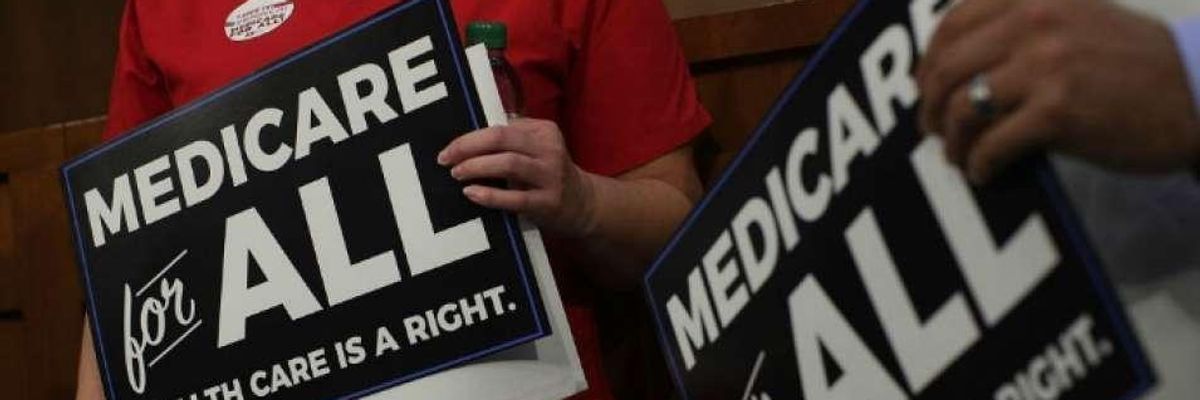
Middle-income families save an average 9% of income; for example, a family earning $62,000 today paying $10,000 per year out of pocket would pay $930. (Photo: Alex Wong/Getty Images)
To donate by check, phone, or other method, see our More Ways to Give page.

Middle-income families save an average 9% of income; for example, a family earning $62,000 today paying $10,000 per year out of pocket would pay $930. (Photo: Alex Wong/Getty Images)
Isn't this a "radical transformation" of the US healthcare system?
No. Medicare for All expands the role of public financing in healthcare- 60% of healthcare is already paid for by our taxes. It does so through an existing "single-payer" called the Medicare Trust Fund that already pays virtually every provider in the US but just for seniors. Under Medicare for All it will cover everybody and reimburse providers who remain mostly private. The new financing replaces all premiums, co-pays and deductibles -Medicare for All is the only reform program to do so.
Besides the government, the primary payers in the current system are the commercial insurance companies, funded by employer contributions, taxes, and individuals (those premiums, co-pays, and deductibles). These insurance companies are "middle men." For prescription drugs, the insurance companies often pay Pharmacy Benefit Managers (PBMs) who set the limits on coverage and pay pharmacies. The Medicare program in part currently uses insurance companies and PBMs. The new Medicare for All will directly pay for prescriptions, services and providers, cutting out all "middle men."
How can we afford Medicare For All?
How does "Medicare for All" achieve savings over the for-profit private insurance system?
Won't long term care bust the budget?
These numbers blow away the insurance industry-funded smoke screen. Medicare for All works. It's the pragmatic alternative to the rising insecurity we feel from escalating costs and huge out of pocket spending - today, we don't know if we'll get the care we need.
Through Medicare for All we will.
Trump and Musk are on an unconstitutional rampage, aiming for virtually every corner of the federal government. These two right-wing billionaires are targeting nurses, scientists, teachers, daycare providers, judges, veterans, air traffic controllers, and nuclear safety inspectors. No one is safe. The food stamps program, Social Security, Medicare, and Medicaid are next. It’s an unprecedented disaster and a five-alarm fire, but there will be a reckoning. The people did not vote for this. The American people do not want this dystopian hellscape that hides behind claims of “efficiency.” Still, in reality, it is all a giveaway to corporate interests and the libertarian dreams of far-right oligarchs like Musk. Common Dreams is playing a vital role by reporting day and night on this orgy of corruption and greed, as well as what everyday people can do to organize and fight back. As a people-powered nonprofit news outlet, we cover issues the corporate media never will, but we can only continue with our readers’ support. |
Isn't this a "radical transformation" of the US healthcare system?
No. Medicare for All expands the role of public financing in healthcare- 60% of healthcare is already paid for by our taxes. It does so through an existing "single-payer" called the Medicare Trust Fund that already pays virtually every provider in the US but just for seniors. Under Medicare for All it will cover everybody and reimburse providers who remain mostly private. The new financing replaces all premiums, co-pays and deductibles -Medicare for All is the only reform program to do so.
Besides the government, the primary payers in the current system are the commercial insurance companies, funded by employer contributions, taxes, and individuals (those premiums, co-pays, and deductibles). These insurance companies are "middle men." For prescription drugs, the insurance companies often pay Pharmacy Benefit Managers (PBMs) who set the limits on coverage and pay pharmacies. The Medicare program in part currently uses insurance companies and PBMs. The new Medicare for All will directly pay for prescriptions, services and providers, cutting out all "middle men."
How can we afford Medicare For All?
How does "Medicare for All" achieve savings over the for-profit private insurance system?
Won't long term care bust the budget?
These numbers blow away the insurance industry-funded smoke screen. Medicare for All works. It's the pragmatic alternative to the rising insecurity we feel from escalating costs and huge out of pocket spending - today, we don't know if we'll get the care we need.
Through Medicare for All we will.
Isn't this a "radical transformation" of the US healthcare system?
No. Medicare for All expands the role of public financing in healthcare- 60% of healthcare is already paid for by our taxes. It does so through an existing "single-payer" called the Medicare Trust Fund that already pays virtually every provider in the US but just for seniors. Under Medicare for All it will cover everybody and reimburse providers who remain mostly private. The new financing replaces all premiums, co-pays and deductibles -Medicare for All is the only reform program to do so.
Besides the government, the primary payers in the current system are the commercial insurance companies, funded by employer contributions, taxes, and individuals (those premiums, co-pays, and deductibles). These insurance companies are "middle men." For prescription drugs, the insurance companies often pay Pharmacy Benefit Managers (PBMs) who set the limits on coverage and pay pharmacies. The Medicare program in part currently uses insurance companies and PBMs. The new Medicare for All will directly pay for prescriptions, services and providers, cutting out all "middle men."
How can we afford Medicare For All?
How does "Medicare for All" achieve savings over the for-profit private insurance system?
Won't long term care bust the budget?
These numbers blow away the insurance industry-funded smoke screen. Medicare for All works. It's the pragmatic alternative to the rising insecurity we feel from escalating costs and huge out of pocket spending - today, we don't know if we'll get the care we need.
Through Medicare for All we will.